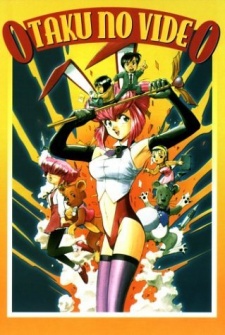
After an hour and a half of Googling, I still haven’t figured out whether the facts and figures about otaku culture presented in Otaku no Video are true or not. It feels too scathing to be true, a mockumentary in the truest form right on the heels of This Is Spinal Tap. At a pivotal moment in anime’s adolescence, a group of nerds considered to be rising stars of the anime community created a hybrid work, walking the boundary of animation and live action, and used it to focus on the feedback loop between amateur fans and burgeoning professionals. To subvert this undertaking, they tell a true story of positivity through animation and a lie of negativity with a camera in hand. They thus made a critique that is ultimately neither positive nor negative, or more accurately it is both extremely positive and extremely negative to the point that they seem to have no purpose, no thesis statement, and more than a touch of cognitive dissonance. With the switch of what is real and what is fake, otaku viewers are confronted with the fact that they see their industry idols through the same tinted lenses they wear when consuming fantasy, while everyone else is forced to doubt what they’ve heard about this niche group of nerds.
The centerpiece is an anime-style fiction about otaku of all interests banding together to succeed both in turning a profit off their hobbies and in convincing the world at large that their basement cartoons and fantasies have meaning. The story itself is loosely based off of the real origin story of Studio Gainax, who produced Otaku no Video fresh off their successes with Royal Space Force: The Wings of Honneamise and Gunbuster. While protagonist Kubo and his sidekick Tanaka are purely fictional, their foray into producing garage figurines after failing to obtain jobs is clearly a callback for Anno and the rest of the team that formed the studio straight out of college, when they produced the opening animations for the Daicon SF conventions in Japan that are now considered cult classics and foundational to the 80’s and 90’s sci-fi anime classics we all know and love. Interestingly enough, the opening to the Daicon IV convention shows up in its unaltered form within Otaku no Film, and one scene has Kubo praising Anno directly by name, creating an eschewed sense of origin that both tells the story of the studio that produced it while also using that very story as the jumping off point for its own fictional retelling.
But slipped in between the anime sections are real-life interviews with otakus so close to the bottom of the barrel that we can’t help wondering how the young team at Studio Gainax managed to get them out of their basements for filming. Later on it was discovered exactly where Gainax found their subjects: in their own company. Not ten years after their founding as an animation studio, Gainax managed to make a short anime celebrating the joys of joining the company of other nerds and spending life just studying, creating quality content for the public even while remaining a target of societal disappointment, and yet in doing so they also spoofed ten whole interviews filled with charts and factoids that make them look like worthless rejects.
Otaku no Video is brilliantly funny, growing more and more ridiculous both in how high the characters of Kubo and Tanaka reach and how low the various interviewees fall in parallel, where the animated story more closely mimics real life than the actual film. It is acutely aware of the culture it exists in, containing countless references to classic anime and sci-fi titles but also centering the interviews around all the anxieties and judgments that form the basis of public opinion on otaku culture. If the facts presented in the work are false, then Studio Gainax has just lampooned us as anime fans for two hours, and left us less educated and far more stigmatized than when we started. If the facts presented in the work are true, then otaku culture in Japan is really in need of fixing. For the otaku viewer it’s a catch-22. And yet regardless of whether or not the facts are true, this concise two-episode package manages to sell the otaku lifestyle as real, worthy of consideration and indeed respect, resolving this quandary by presenting a work that lends undeniable credence to the community as a whole, even while it sets about sinking its own ship with a mischievous grin.